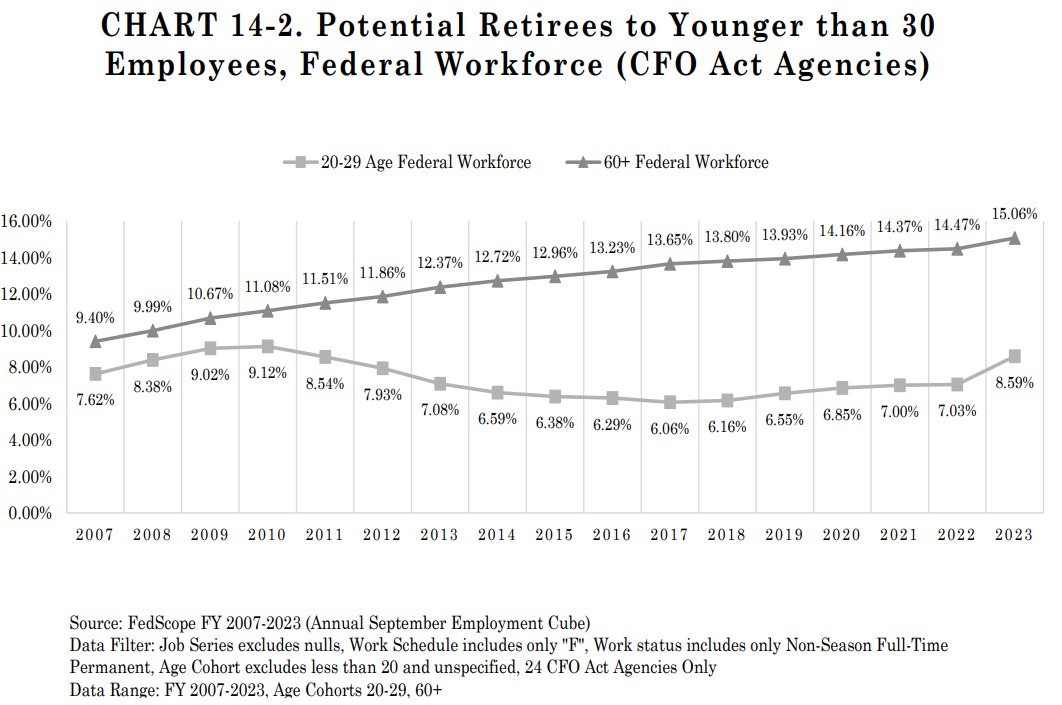The number of young federal workers has long lagged behind the national workforce, but there are early signs of a growing number of young workers in government agencies.
Data from the Office of Management and Budget shows a 33% increase in the number of federal interns from fiscal year 2022 to fiscal year 2023. And in the past few years alone, the number of federal employees under the age of 30 has increased significantly.
“We've increased this by 13%, but we still have a long way to go,” Jason Miller, OMB's deputy director for management, told members of the House Oversight and Accountability Committee. last week's hearing.
This is a different data point than the percentage of federal employees under 30. In the Biden administration's fiscal year 2025 budget request, OMB reported a slight increase in the percentage of employees under age 30, rising from about 7% to now about 8.6%. .

But overall, it's clear that expanding junior staff is part of the White House's fiscal year 2025 budget request, and has been a growing priority for at least the past few years. OMB's Miller told the oversight committee that he believes the agency is well positioned for further development of its junior employees.
“We are building a platform and incentivizing agencies to hire interns across their agencies so that those who demonstrate their skills during an internship can fill open positions,” Miller said at the hearing. Stated.
For example, agencies just recently gained access to a new intern conversion database from the Office of Human Resources Management. In March, OPM launched the Intern Talent Program. This is an online database for federal administrators to find all Pathway Program interns currently eligible to convert to full-time positions. This database is available through USAJobs' Agency Talent Portal.
Additionally, recent OPM Pathway program updated, aims to expand opportunities for early career employees. The new regulations place more emphasis on paid federal internships, allow higher starting salaries for new graduates, and allow credits in career and technical education programs to count towards pathway hours.
OPM will also be released later this year. schedule Create a government-wide mentoring program to help federal interns connect across agencies and work more closely with senior leadership.
“By building a deeper pipeline of workers early in their careers, the government will ensure that it can fulfill its mission without interruption when workers retire,” Miller said in his supervisory testimony last week. Ta.
However, agencies are still struggling to shift their recruiting strategies. In it, OPM states: Future Workforce Handbook Agencies view early-career employees as short-term hires and don't necessarily incorporate them into long-term workforce plans or reserve positions specifically for younger talent.
OPM remains committed to helping agencies better leverage their junior workforce and make it a priority, not an afterthought.
To get more entry-level employees hired into government agencies, OPM says agencies should “align early-career recruitment to mission-critical job skill gaps and use pathways and other “We aim to attract new hires and secure funding by offering paid internships and full-time employment as interns convert to full-time employees,” OPM said in its strategy document. It is stated in
Emphasis on the skills of young employees
Part of developing early career talent includes encouraging agencies to focus on skills-based hiring. This could be especially helpful for her federal IT employees. Even more obvious age difference That's more than all federal employees.
That is why cyber leaders across the government are now push We aim to hire more based on skills. This means focusing less on education and more on the talent and abilities of the job seeker.
“We're moving away from having a degree purely as evidence to access a job,” Miller said at a hearing last week. “Do you have the skills to do the job and the ability and energy to serve the people? Our federal government needs to reflect the people it serves. And frankly, We believe this will continue to strengthen our performance.”
The White House just committed to hiring skills-based jobs For most federal IT jobsOPM will take on the task of transitioning approximately 100,000 federal cyber and IT jobs to skill-based employment by next summer.
“We're competing for talent,” Miller said. “Advanced technical skills are increasingly needed.”
We still have a long way to go. Currently, the percentage of federal employees with a master's degree or higher is significantly higher than the percentage of the entire workforce. However, in recent years the number has been on a slight decline. At the same time, the proportion of federal employees with only high school degrees is gradually increasing.
A skills-based hiring strategy is also a priority on Capitol Hill. Two of his bipartisan bills recently passed the Oversight Committee. push agencyand one more federal contractorhire employees using actual practical skills rather than education.
“There are thousands of federal IT job vacancies, and there are four times as many IT workers in the federal workforce over the age of 60 as there are under 30,” said Rep. Nancy Mace, R.S., who introduced the pair. .C.) said. she said during an oversight committee hearing last week. “I believe part of the solution is thinking outside the box and hiring more creatively.”
Asked about the bill's focus on skill-based hiring for federal employees, OMB's Miller said, “This is absolutely the right approach for us to take.”
Miller added: “If we bench parts of the country and deny them access, we lose potential skills and expertise that could serve the American people in these roles. ” he added.
Copyright © 2024 Federal News Network. All rights reserved. This website is not directed to users within the European Economic Area.
Summarize this content to 100 words
The number of young federal workers has long lagged behind the national workforce, but there are early signs of a growing number of young workers in government agencies.
Data from the Office of Management and Budget shows a 33% increase in the number of federal interns from fiscal year 2022 to fiscal year 2023. And in the past few years alone, the number of federal employees under the age of 30 has increased significantly.
“We've increased this by 13%, but we still have a long way to go,” Jason Miller, OMB's deputy director for management, told members of the House Oversight and Accountability Committee. last week's hearing.
This is a different data point than the percentage of federal employees under 30. In the Biden administration's fiscal year 2025 budget request, OMB reported a slight increase in the percentage of employees under age 30, rising from about 7% to now about 8.6%. .
Source: Office of Management and Budget, Fiscal Year 2025 Budget Request, Analytical Perspectives Section “Strengthening the Federal Workforce.”
But overall, it's clear that expanding junior staff is part of the White House's fiscal year 2025 budget request, and has been a growing priority for at least the past few years. OMB's Miller told the oversight committee that he believes the agency is well positioned for further development of its junior employees.
“We are building a platform and incentivizing agencies to hire interns across their agencies so that those who demonstrate their skills during an internship can fill open positions,” Miller said at the hearing. Stated.
For example, agencies just recently gained access to a new intern conversion database from the Office of Human Resources Management. In March, OPM launched the Intern Talent Program. This is an online database for federal administrators to find all Pathway Program interns currently eligible to convert to full-time positions. This database is available through USAJobs' Agency Talent Portal.
Additionally, recent OPM Pathway program updated, aims to expand opportunities for early career employees. The new regulations place more emphasis on paid federal internships, allow higher starting salaries for new graduates, and allow credits in career and technical education programs to count towards pathway hours.
OPM will also be released later this year. schedule Create a government-wide mentoring program to help federal interns connect across agencies and work more closely with senior leadership.
“By building a deeper pipeline of workers early in their careers, the government will ensure that it can fulfill its mission without interruption when workers retire,” Miller said in his supervisory testimony last week. Ta.
However, agencies are still struggling to shift their recruiting strategies. In it, OPM states: Future Workforce Handbook Agencies view early-career employees as short-term hires and don't necessarily incorporate them into long-term workforce plans or reserve positions specifically for younger talent.
OPM remains committed to helping agencies better leverage their junior workforce and make it a priority, not an afterthought.
To get more entry-level employees hired into government agencies, OPM says agencies should “align early-career recruitment to mission-critical job skill gaps and use pathways and other “We aim to attract new hires and secure funding by offering paid internships and full-time employment as interns convert to full-time employees,” OPM said in its strategy document. It is stated in
Emphasis on the skills of young employees
Part of developing early career talent includes encouraging agencies to focus on skills-based hiring. This could be especially helpful for her federal IT employees. Even more obvious age difference That's more than all federal employees.
That is why cyber leaders across the government are now push We aim to hire more based on skills. This means focusing less on education and more on the talent and abilities of the job seeker.
“We're moving away from having a degree purely as evidence to access a job,” Miller said at a hearing last week. “Do you have the skills to do the job and the ability and energy to serve the people? Our federal government needs to reflect the people it serves. And frankly, We believe this will continue to strengthen our performance.”
The White House just committed to hiring skills-based jobs For most federal IT jobsOPM will take on the task of transitioning approximately 100,000 federal cyber and IT jobs to skill-based employment by next summer.
“We're competing for talent,” Miller said. “Advanced technical skills are increasingly needed.”
We still have a long way to go. Currently, the percentage of federal employees with a master's degree or higher is significantly higher than the percentage of the entire workforce. However, in recent years the number has been on a slight decline. At the same time, the proportion of federal employees with only high school degrees is gradually increasing.
Source: Office of Management and Budget, Fiscal Year 2025 Budget Request, Analytical Perspectives Section “Strengthening the Federal Workforce.”
Source: Office of Management and Budget, Fiscal Year 2025 Budget Request, Analytical Perspectives Section “Strengthening the Federal Workforce.”
A skills-based hiring strategy is also a priority on Capitol Hill. Two of his bipartisan bills recently passed the Oversight Committee. push agencyand one more federal contractorhire employees using actual practical skills rather than education.
“There are thousands of federal IT job vacancies, and there are four times as many IT workers in the federal workforce over the age of 60 as there are under 30,” said Rep. Nancy Mace, R.S., who introduced the pair. .C.) said. she said during an oversight committee hearing last week. “I believe part of the solution is thinking outside the box and hiring more creatively.”
Asked about the bill's focus on skill-based hiring for federal employees, OMB's Miller said, “This is absolutely the right approach for us to take.”
Miller added: “If we bench parts of the country and deny them access, we lose potential skills and expertise that could serve the American people in these roles. ” he added.
Copyright © 2024 Federal News Network. All rights reserved. This website is not directed to users within the European Economic Area.
https://federalnewsnetwork.com/hiring-retention/2024/05/still-long-way-to-go-after-13-bump-in-federal-early-career-employees/ Even with a 13% increase in the number of junior federal employees, there is a 'long way to go'
